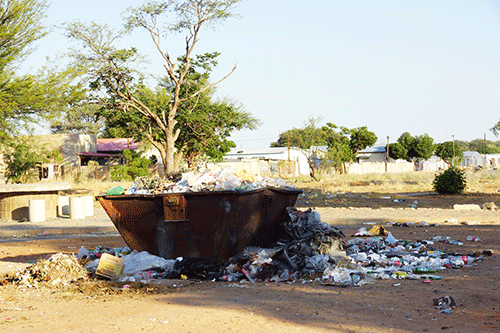GOBABIS – Gobabis residents, especially those living at the vast Epako location and surrounding areas, are dismayed by the rubbish-ridden streets, a situation they fear is fast becoming a health hazard.
Piles of garbage, overflowing skip containers and scavenging dogs and mice meet the naked eye at almost every street corner in Epako township, particularly in the area close to the town’s popular market, where vendors sell their various food items.
The deteriorating situation is a result of the mechanically-unfit and unroadworthy refuse removal trucks of the Gobabis municipality. The trucks were out of service for weeks, and that disrupted the normal refuse collection schedule.
“The municipality experienced a challenge with our refuse removal trucks, whose roadworthiness permits expired last
month.
There was a problem with the licence disc renewal at the local Natis office because the municipality paid for the renewal through EFT, and it took some time for the Natis office to get confirmation of payment.
We also had the challenge of a broken truck, which can only be serviced in Windhoek, but this has all been done. All these trucks are all now back at work,” explained Gobabis municipality’s spokesperson, Taekulu Ueitele.
The town’s Epako market resorts under the Namibia Industrial Development Agency.
It is here that most of the town’s small business owners ply their trade with various goods such as food clothes, and others.
Both the vendors and residents’
complaints are that the market and surrounding small businesses are slowly losing their appeal to potential customers
due to the unhygienic environment, as shoppers find it difficult to consume their food and beverages in such a dirty
set-up.
Admission
Ueitele admitted that the town is grappling with a growing littering problem, but insisted that the community members too have an important role to play in ensuring that the town and its localities remain clean at all times.
“The municipality conducted public awareness campaigns in those areas, and even appointed individuals against an allowance to take care of the skip containers, and advise residents on dumping refuse. However, these efforts fell on deaf ears, as some residents have an ‘I don’t care’
attitude.
Some of our residents are also responsible for these situations by scavenging in the skip containers and, in the process, removing refuse, which ends up being spread around the containers, causing an unpleasant sight and an unhygienic situation.”
Residents
Expressing his disgust at the town’s state of affairs, Johannes Rooinasie, a 68-year-old Epako resident who also frequents the market, said the situation is getting worse by the day, as almost every street has now become a dumping ground due to the municipality’s failure to place and collect skip containers in the demarcated areas.
“Some years ago, one would see metal rubbish bins, where community members could dispose of their household garbage, but that is no longer the case. Some of these skip containers that you are seeing have
been standing there for weeks and weeks, and that’s why they are overflowing with garbage. The smell coming from there is unbearable for us as residents, and for pensioners like me who mostly go to the marketplace to buy cooked food, it is difficult to eat with such a bad smell all over,” an irritated Rooinasie vented.
Emilia Ekandjo, another resident of
Epako and a mother of three, also complained about the growing stench coming from the dumps.
“When you go to any of those dumpsites in one of the streets, you will come across mice and cats that have now turned our streets into unhealthy places. Undomesticated cats are especially prone to carrying various diseases, and these dumpsites are close to our houses. Our children are in danger of getting sick because of these cats and mice. The municipality must do something to improve the situation, because this is unacceptable. Their bins are never collected on time, and even when they are, they do not make an effort to clean the area around the bins. It’s really a sad situation in Epako,” added Ekandjo.
Tjipuna Muundjua, a 44-year-old who sells soup bones and meat at the settlement, shared that the town’s filthy streets are making it hard for their businesses to thrive, as many customers complain about the bad smell and the garbage scattered around.
“We try to explain to them [customers] that the situation is really beyond us, as the municipality hardly makes an effort to clean the neighbourhoods. In my case, I make an effort every day to clean the spot where I sell my food, and make sure that my clients are happy with my set-up. But it does not help much because the trash is just lying all over the streets. It’s not healthy at all.”
As a long-term solution, Ueitele said the municipality is in the process of filling vacant positions at the department responsible for waste management, and plans to appoint temporary employees who will be responsible for the cleaning of the town.


